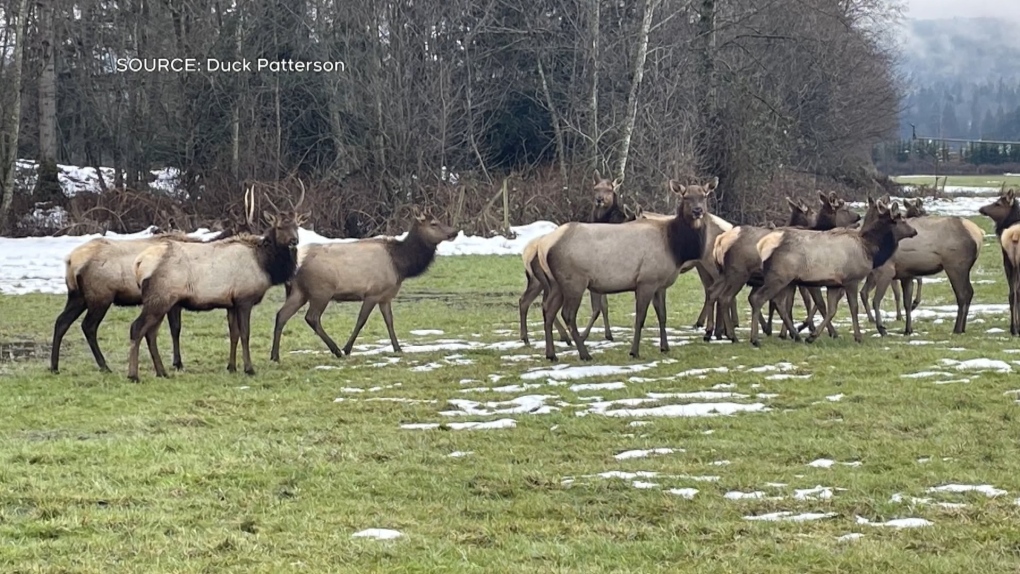Vancouver Island farmers struggle to deal with threatened elk species
 (Duck Patterson)
(Duck Patterson)
Farmers in the Cowichan Valley are losing crops and dealing with property and field damage caused by Roosevelt Elk, which have become a regular fixture on some farms in the area.
The threatened species typically moves to lower elevations during the winter months searching for more plentiful food, but in the last few years, in the Duncan area, some herds have been staying year-round on farmland.
In North Oyster, where Howie Davis has farmed cattle for more than 50 years, a herd of 12 elk showed up in December four years ago. Fortunately for him, they've so far always left by February or March.
"The herds are expanding every year," said Davis.
In the few months the elk are on the farm, Davis said they cause a lot of damage, knocking down fences, tearing the hay fields up with their hooves and eating whatever hay is growing over the winter "right down to nothing."
The elk damage to the hay fields has reduced the number of harvests from four to three in a season, said Davis.
"That’s one crop you don’t get to sell, less income," he said. "[The provincial government has] been compensating me for that … not to what it costs."
A University of Alberta research project intended to reduce human-elk conflict in the Cowichan Valley started in August 2021.
The team has set up multiple trail cameras in the valley to gather data on the herds' numbers and movements.
"To implement any sort of management strategies we need to have a good understanding of what’s happening with the population, how many are there, where are they on the landscape and how are they interacting with human infrastructure?" said Kate Rutherford, a masters student at the University of Alberta.
Rutherford says the provincial government has put a lot of effort into increasing the elk herds in the Cowichan Valley to create a healthy, sustainable population, which seems to have paid off.
"Everyone wants the population to be at healthy levels," she said.
"There’s also that balance, right, with maintaining a healthy population size but also minimizing the occurrence of human-elk conflict, which is going to increase as urbanization increases," she added.
Researchers are also planning to test deterrents to keep elk out of farms.
"We plan to broadcast predator vocalization on the perimeter of these fields where we’re currently monitoring elk using camera traps, and they will be broadcasted when triggered by animal movement," said Rutherford.
The team is also asking landowners in the area to contribute to their research by reporting elk sightings to them either through the iNaturalist app or by emailing the team directly at rooselk@ualberta.ca
The researchers hope to share their work with farmers and the provincial government as way to help with the management of Roosevelt Elk.
CTVNews.ca Top Stories

There's actually no such thing as vegetables. Here's why you should eat them anyway
The rumours are true: Vegetables aren't real — that is, in botany, anyway. While the term fruit is recognized botanically as anything that contains a seed or seeds, vegetable is actually a broad umbrella term.
'It looked so legit': Ontario man pays $7,700 for luxury villa found on Booking.com, but the listing was fake
An Ontario man says he paid more than $7,700 for a luxury villa he found on a popular travel website -- but the listing was fake.
The Met Gala was in full bloom with Zendaya, Jennifer Lopez, Mindy Kaling among the standout stars
The Met Gala and its fashionista A-listers on Monday included Jennifer Lopez, Zendaya and a parade of others in a swirl of flora and fauna looks on a green-tinged carpet lined by live foliage.
Israeli forces seize Rafah border crossing in Gaza, putting ceasefire talks on knife's edge
Israeli tanks seized control of Gaza's vital Rafah border crossing on Tuesday as Israel brushed off urgent warnings from close allies and moved into the southern city even as cease-fire negotiations with Hamas remained on a knife's edge.
Canadian cadets rock mullets and place second at U.S. military competition
Sporting mullets, Canadian Armed Forces officer cadets placed second in an annual military skills competition in the U.S.
Highlights from the 2024 Met Gala exhibit: Sleeping Beauty would wake up for these gowns
Sure, she was a royal princess and all. But there’s no way Sleeping Beauty — either before or after her nap — ever had quite the fabulous wardrobe that’s been assembled at the Metropolitan Museum of Art.
Noelia Voigt resigns as Miss USA, citing her mental health
Noelia Voigt, who was crowned Miss USA in November 2023, has announced she is resigning from her role, saying the decision is in the best interest of her mental health.
Putin begins his fifth term as president, more in control of Russia than ever
Vladimir Putin began his fifth term Tuesday as Russian leader at a glittering Kremlin inauguration, setting out on another six years in office after destroying his political opponents, launching a devastating war in Ukraine and concentrating all power in his hands.
Winnipeg man admits to killing four women, argues he's not criminally responsible
Defence lawyers of Jeremy Skibicki have admitted in court the accused killed four Indigenous women, but argues he is not criminally responsible for the deaths by way of mental disorder – this latest development has triggered a judge-alone trial rather than a jury trial.
































